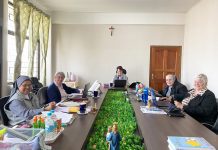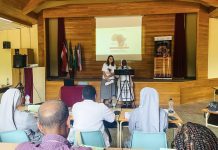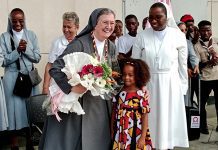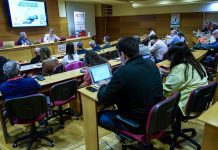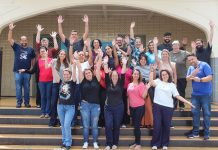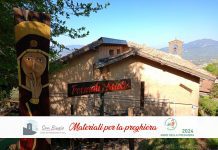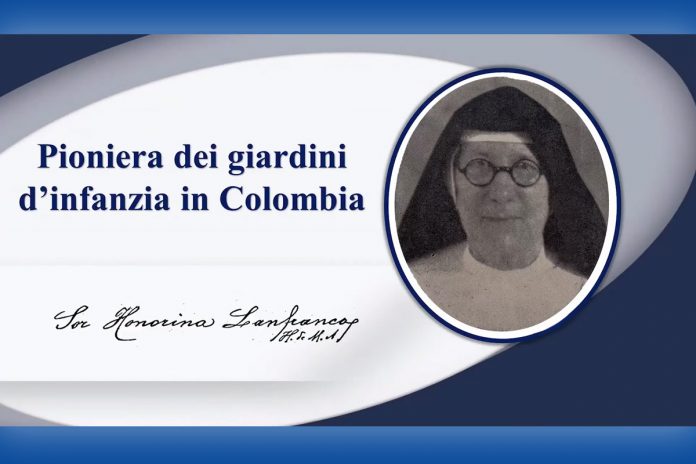Rome (Italy). On 3 March 2022, in the 5th appointment of “Salesian Thursdays at Auxilium”, the initiative of the Studies Center on the FMA of the Pontifical Faculty of Educational Sciences “Auxilium” in Rome with in-depth studies on pedagogy, spirituality, and history of the Daughters of Mary Help of Christians, Sr. Monica Tausa, Colombian Daughter of Mary Help of Christians, deepened the theme: “Sr. Onorina Lanfranco: pioneer of kindergartens in Colombia.”
In introducing the meeting, Sr. Grazia Loparco, Professor of Church History in the Faculty “Auxilium”, underlines how Sr. Onorina Lanfranco is little known by the FMA, but studied in depth by various scholars and pedagogists, for having established in Colombia, in the first decades of the 1900’s, kindergartens that have given a qualitative contribution to pedagogical knowledge and educational practice for young children.
Sr. Monica Tausa, in her presentation, highlighted the uniqueness of this figure, with elements that make her a pedagogue in every sense: formation, vocation, pedagogical experience, formative spirit, the ability to systematize thought and put into dialogue the principles of Catholic spirituality and the contributions of Mother Emilia Mosca, assistant to the first teachers who were formed in Nizza Monferrato. Her Salesian educational formation was also influenced by the orientations mentioned by Mother Clelia Genghini in the text, “A year at the school of the Mother Assistant”.
Sr. Onorina was born in Valfrenera, Asti on 30 April 1872 and died in Medellín, Colombia, on 31 December 1948. In 1894, she entered the Institute of the Daughters of Mary Help of Christians already with pedagogical skills, for which she was immediately entrusted with the task of teacher of girls and teacher of teachers, or sisters. Head of two elementary classes in the Our Lady of Grace School in Nizza Monferrato, she received the student sisters who came to learn from her every day.
In 1901 she discovered her missionary vocation and the Superior General, Mother Catherine Daghero, sent her to Colombia, in Bogotá, where she arrived in 1903. After having promoted the educational mission of the School of the capital, she was sent to found several Mary Help of Christians Schools in other cities of the country. In particular, she especially develops the work as a kindergarten for children aged 4 to 5, of which she becomes a pioneer and an authoritative point of reference in the field of early childhood education.
The work of Sr. Onorina is inserted and explained in the light of the great pedagogues of her time and the educational options of the FMA Institute. She translates, develops, and understands, with intuition and tenacity, the contribution of European, Italian, and Salesian pedagogy in the country. She herself acknowledges, “In Colombia, little importance has been given to kindergartens. It has not yet been possible to appreciate the importance of the little child acquiring a certain level of development before going to school.”
In the presentation, Sr. Monica explores the influences of the different currents and figures of pedagogists in the educational and pedagogical work of Sr. Onorina at the service of young children in Colombia.
In a short time, the excellence of her Kindergarten is recognized and the Secretary of Education asks her to publish her Educational Program and to give the authorization to adopt it throughout the Antioquia department, guiding all teachers and providing them with regulations. She is also asked to personally create and direct the chair of Child Pedagogy at the Instituto Normal Femenino in Medellín. Unfortunately, it is not possible to establish how many books she wrote and published, because the Archbishop of Bogota censored her work, accusing her of ‘modernism’.
The work of Sister Onorina, therefore, in addition to being pioneering in the education of young children, also demonstrates a great ability to influence public educational policy in Antioquia and in all the other regions where the Institute was present in Colombia.
Finally, Sr. Monica summarizes the richness of the legacy, still to be studied and discovered, of this FMA who was: expert teacher in pedagogical and didactic art, wise educator able to make a contribution to Catholic education by putting modern postulates in dialogue with the Preventive System, pioneer of early childhood education in Colombia, tireless teacher formator, creator of a pedagogical experience that has influenced public policy, writer of several volumes of pedagogy, methodology, teaching, and early childhood education.
She concludes by leaving a question: on this 150th anniversary of the foundation of the Institute and the birth of Sr. Onorina, is it not perhaps the right moment to recognize that there is a Salesian style of child pedagogy waiting to be reconstructed, conceptualized, and taught, so that the life of many young children can be full and dignified?



